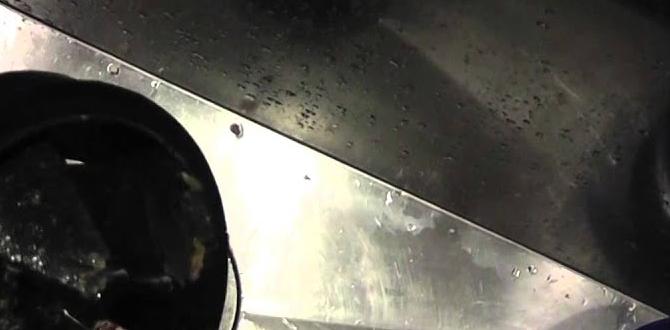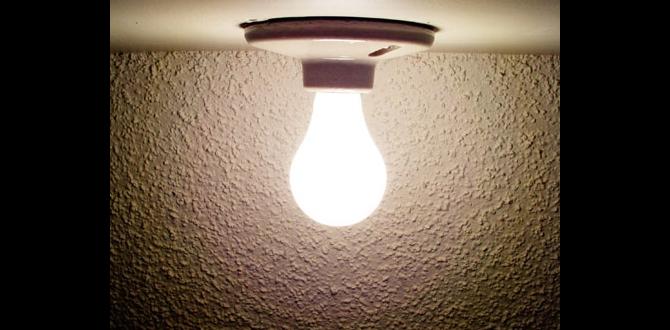Have you ever walked into your kitchen and sniffed something unpleasant coming from the sink? It’s not nice, is it? Many people face this problem. You might wonder, “How can I get rid of the smell in my kitchen sink?” Well, you’re not alone. A stinky sink can make cooking and cleaning a hassle.
Here’s something interesting: the smells often come from leftover food, grease, or even trapped air. They hide in your pipes, waiting for the right moment to make their presence known. But don’t worry, there are easy ways to tackle this issue.
Imagine inviting friends over for dinner, but you’re embarrassed by the kitchen sink’s smell. It can ruin the mood. Fortunately, with a few simple steps, you can keep your kitchen fresh and welcoming. Let’s explore how to get rid of that smell in your kitchen sink so you can enjoy your space again!
How To Get Rid Of Smell In Kitchen Sink: Effective Tips

How to Get Rid of Smell in Kitchen Sink
Unpleasant smells in your kitchen sink can be annoying. Did you know that a mix of baking soda and vinegar can work wonders? When combined, they fizz and help remove buildup. You can also try lemon peels for a fresh scent. Simply drop them in and run your disposal. Regular cleaning with hot water keeps odors away. These simple tricks make your kitchen smell inviting again. Isn’t it fun to learn easy tips for a cleaner home?Common Causes of Kitchen Sink Odors
Identification of food residue and waste buildup. Impact of plumbing issues and stagnant water.Bad smells from your kitchen sink often come from a few key sources. First, food particles can get stuck in the drain. This food residue decays over time, making an awful odor. Second, plumbing problems, like leaks, can cause stagnant water to build up. This water becomes a home for bacteria, making the smell worse. Keep the sink clean to help avoid these issues.
What are some common sources of kitchen sink odors?
Common sources include food residue and plumbing issues. These factors lead to smells that can linger and be hard to remove.
Key points:
- Food residue decays and smells bad.
- Stagnant water allows bacteria to grow.
- Leaky pipes can lead to unpleasant odors.
DIY Cleaning Solutions
Use of baking soda and vinegar for odor neutralization. Application of lemon and salt for freshening smell.Cleaning your kitchen sink can be easy with common items. Mixing baking soda and vinegar creates a fizzing reaction. This helps neutralize bad smells. Pour half a cup of each down the sink. Rinse with hot water after a few minutes.
Lemon and salt also freshen up your sink. They work together to fight odors. Rub half a lemon sprinkled with salt on the sink. Let it sit for 5 minutes before rinsing. Your kitchen will smell clean and bright!
What are the benefits of using DIY cleaning solutions?
DIY cleaning solutions are safe, cheap, and make your sink smell fresh. They avoid harsh chemicals and are easy to find at home.
Regular Maintenance Tips
Importance of routine cleaning and inspection. Best practices for daily kitchen sink hygiene.Keeping your kitchen sink fresh starts with simple daily habits. Routine cleaning can save you from stinky surprises later. Wipe down the sink after use with a sponge and warm, soapy water. This helps remove food particles and bacteria. Don’t forget to check the drain for clogs, which can hold smells like a secret stash of leftovers. A quick rinse at the end of the day can keep your sink smelling like roses, or at least not like last week’s lasagna!
| Tip | Description |
|---|---|
| Daily Wipe | Use warm, soapy water to clean the sink |
| Drain Check | Inspect for clogs and remove debris |
| Quick Rinse | Rinse the sink at the end of the day |
These small steps can keep your kitchen sink clean and fresh. Remember, a happy sink leads to a happy cook! Who wouldn’t want a sink that smells as good as your dinner?
Advanced Odor Removal Techniques
Utilizing enzymebased cleaners for deep cleaning. Employing boiling water and detergent methods.Ever wonder how to tackle that pesky smell in your kitchen sink? Try using enzyme-based cleaners! They’re like tiny superheroes, breaking down food particles and odors into nothing. Pour it down the drain, let it work its magic, and voila! You can also boil some water and mix in a squirt of detergent. Pouring this hot mix down the sink will send those stinky smells packing. It’s like a spa day for your sink!
| Method | How It Works |
|---|---|
| Enzyme Cleaners | Break down food and bacteria |
| Boiling Water & Detergent | Flushes away smells and greases |
Preventive Measures to Avoid Future Smells
Proper disposal methods for food waste. Installation of sink strainers and disposal units.Keeping your kitchen sink fresh is easy with a few steps. First, always throw compostable food waste in the trash, not down the sink. This keeps bad smells at bay. Installing a sink strainer helps catch food bits. These protect pipes and reduce odors. A garbage disposal unit is also useful. It chops food waste into tiny pieces, making disposal simple. Regular maintenance ensures your sink stays clean and odor-free.
How can I keep my kitchen sink from smelling?
Use proper disposal methods for food waste. Install a sink strainer and a garbage disposal unit. These tools help stop smells before they start.
When to Seek Professional Help
Signs that indicate potential plumbing issues. Benefits of hiring a plumber for persistent odors.Sometimes, the smell in your kitchen sink won’t budge, even after your best efforts. This may mean trouble is brewing under the surface. Watch for signs like slow drainage, gurgling noises, or even water pooling around the base. These could indicate plumbing issues that need a pro’s touch. Hiring a plumber can be a smart move for persistent odors. They have the skills to tackle problems you can’t see and save you from becoming a DIY disaster hero. Plus, they can spot other hidden issues, preventing major headaches down the line.
| Signs You Need Help | Benefits of Hiring a Plumber |
|---|---|
| Slow draining water | Expert diagnosis |
| Gurgling sounds | Prevent future problems |
| Water pooling | Time-saving solutions |
Conclusion
To get rid of smells in your kitchen sink, start by cleaning it regularly. Use baking soda and vinegar for deep cleaning. Don’t forget to check for food scraps in your drain. If the smell persists, consider a professional plumber. Take these simple steps today to keep your kitchen fresh. For more tips, keep reading and explore helpful resources!FAQs
What Are Some Natural Remedies To Eliminate Odors From My Kitchen Sink?You can use baking soda and vinegar to remove smells. First, pour half a cup of baking soda down the sink. Then, add half a cup of vinegar. Let it fizz for a few minutes, and then rinse with hot water. You can also try lemon juice. Just squeeze some into the sink for a fresh scent!
How Often Should I Clean My Kitchen Sink To Prevent Bad Smells From Developing?You should clean your kitchen sink at least once a week. This helps keep away bad smells. You can also rinse it after you use it. If you notice any smells, clean it right away. Keeping it clean will help your kitchen smell fresh!
What Are The Common Causes Of Smells Coming From A Kitchen Sink?Smells from a kitchen sink can come from food scraps stuck in the drain. They can also happen if the pipes have leftover grease. Sometimes, a dirty garbage disposal can cause bad odors, too. If there’s a problem with the plumbing, like a leak or blockage, that might make things smell bad, too. We should clean the sink and pipes to keep them fresh!
Are There Any Specific Products Or Cleaners Recommended For Getting Rid Of Sink Odors?To get rid of sink odors, you can use baking soda and vinegar. First, pour some baking soda down the drain. Then, add vinegar and let it foam up. After a little while, rinse it with hot water. You can also use lemon juice to help freshen up the smell.
How Can I Maintain A Fresh-Smelling Kitchen Sink And Drain Over Time?To keep your kitchen sink and drain smelling fresh, you can start by cleaning them often. Pour some baking soda down the drain, then add vinegar. This will help get rid of bad smells. You can also run hot water down the drain every week. Finally, always rinse away food scraps and use a sink strainer to catch bits of food!








